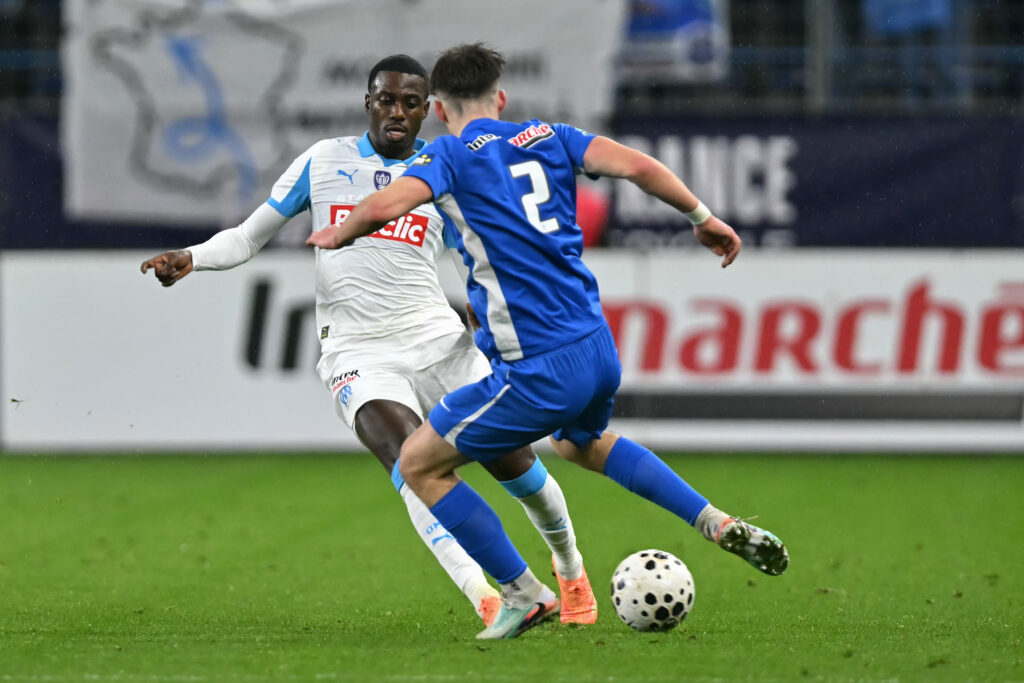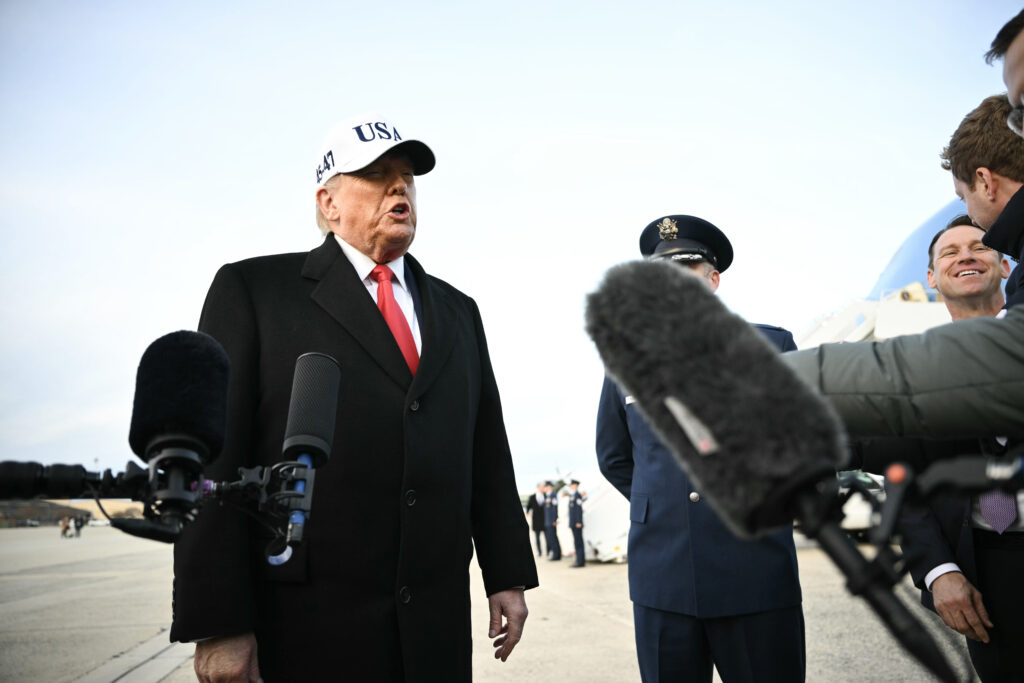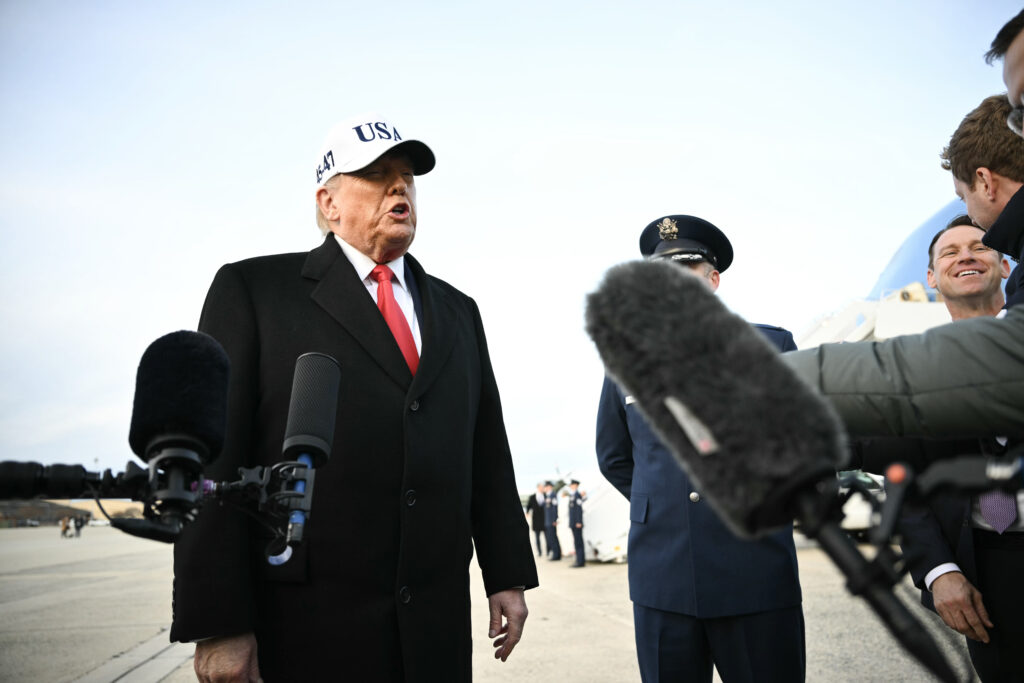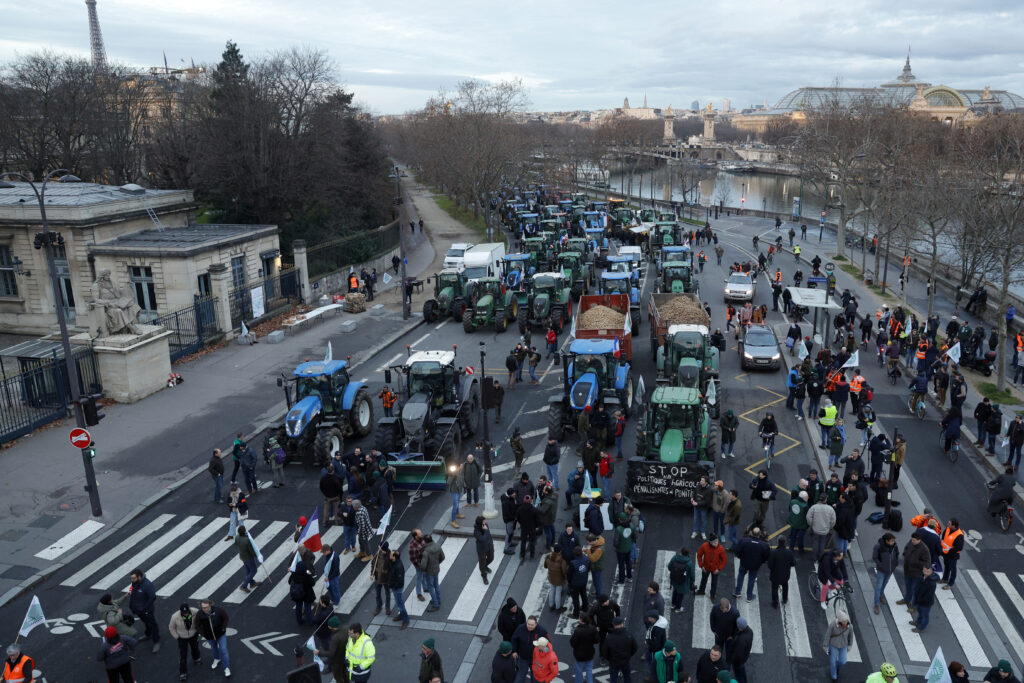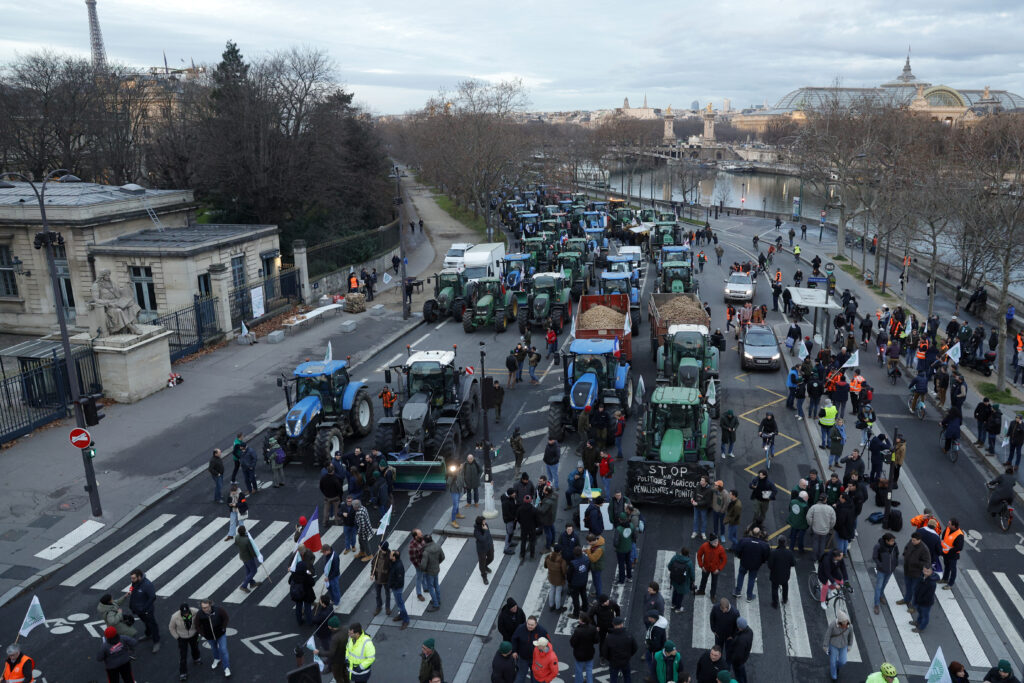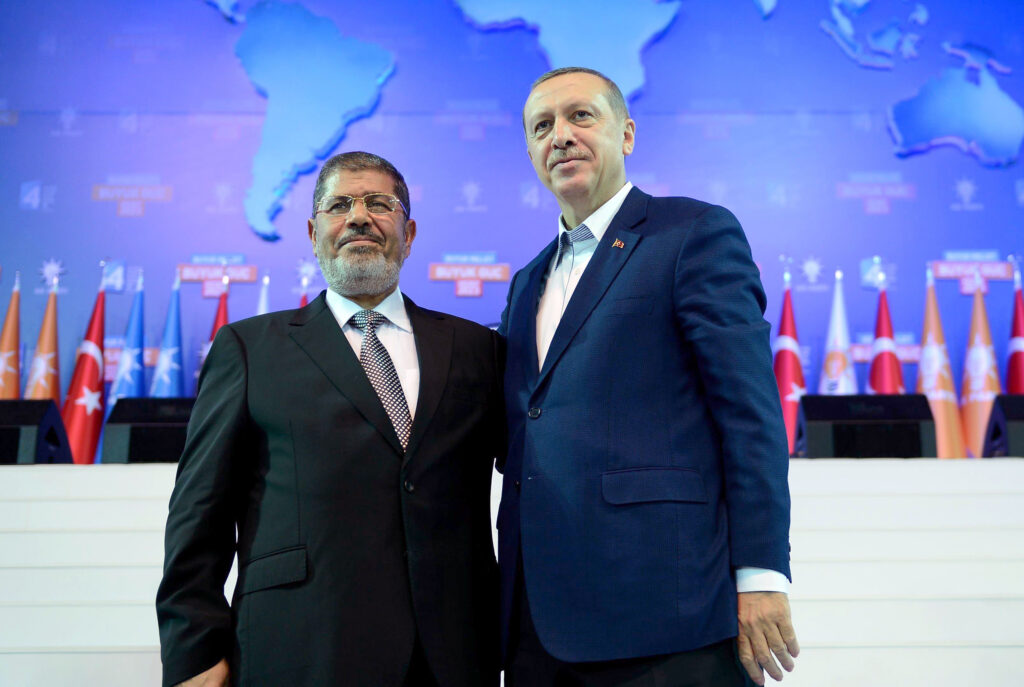Coupe de France: sans pitié pour Bayeux, Marseille passe en 8e
Appliqué et sans fioritures, Marseille a logiquement écrasé Bayeux (9-0), équipe de 6e division, mardi en clôture des 16e de finale de la Coupe de France pour s’offrir un 8e à domicile contre Rennes, début février.La compétition semble désormais ouverte comme jamais avec l’élimination du Paris SG lundi par le Paris FC (0-1).En attendant, comme au tour précédent face à Bourg-Personnas (D3, 6-0), les hommes de Roberto de Zerbi ont fait preuve du plus grand sérieux dans un Stade Michel-d’Ornano de Caen à guichets fermés et largement acquis à la cause des bleu et jaune.Devant le millier de leurs supporters qui avait fait le déplacement avec une banderole en hommage à leur ancien joueur et entraîneur Rolland Courbis — “Repose en paix Rolland, ton passage marseillais restera à jamais gravé” –, l’OM a rapidement éliminé tout suspense.Après deux coups de semonce d’Amir Murillo (2e) et Emerson Palmieri (3e), une belle ouverture de Mason Greenwod a permis à Murillo de trouver Angel Gomes en retrait pour l’ouverture du score dès la 13e minute.Six minutes plus tard, Hamed Traoré, à l’affût au point de pénalty a profité d’une sortie aérienne un peu courte d’Oscar Lecanu pour doubler la mise malgré deux défenseurs entre le but et lui (0-2, 19e).Jouant crânement leur chance, les Normands se sont ensuite faits punir après un pressing à 6 dans les 20 mètres marseillais, Greenwood étant trouvé sur la droite à la conclusion d’un contre éclair pour le 0-3 (26e).Gouiri, qui avait raté le 0-4 à la 30e face au but, s’est rattrapé deux minutes plus tard sur une occasion pratiquement identique, offrant un large avantage de quatre buts au retour aux vestiaires.En seconde période, Gouiri et Greenwood se sont fait des politesses, le premier servant le second à quelques centimètres du but pour le 0-5 (49e) avant que l’Anglais ne lui rendre la pareille six minutes plus tard (0-6, 55e).Toujours pas rassasiés, les Phocéens ont aggravé la marque par Conrad Egan-Riley (0-7, 80e), Neal Maupay (0-8, 86e) et Greenwood, pour son triplé (0-9, 90e).
Trump vows ‘very strong action’ if Iran hangs protesters
President Donald Trump said Tuesday that the United States would react strongly if authorities in Iran started hanging people in their crackdown on a popular uprising against the government.”We will take very strong action if they do such a thing,” he told CBS News in an interview, when asked about hangings potentially beginning on Wednesday.”When they start killing thousands of people — and now you’re telling me about hanging. We’ll see how that’s going to work out for them,” Trump said in a video clip released online.The interview took place as Trump was in the northern US state of Michigan to visit a manufacturing plant and deliver a speech on the economy.In his speech, Trump reiterated a message he had posted earlier on social media, that “help is on its way” for the Iranian protesters.He also said it was unclear what the death toll in Iran actually was.”I hear numbers — look, one death is too much — but I hear much lower numbers, and then I hear much higher numbers,” he said.Later, speaking to reporters on his return to Washington, Trump said he would soon be receiving a briefing on Iran.”The killing looks like it’s significant, but we don’t know yet for certain. I’ll know within 20 minutes — and we’ll act accordingly,” he said.Trump had previously vowed the United States would get involved if protesters were killed, a line crossed days ago.At least 734 people are confirmed to have been killed, though the actual death toll is likely in the thousands, Norway-based NGO Iran Human Rights (IHR) said Tuesday.Fears have also grown that the Islamic republic could use the death penalty to crack down on the protests, after Tehran prosecutors said authorities would press capital charges of “moharebeh,” or “waging war against God,” against some suspects arrested over recent demonstrations.”Concerns are mounting that authorities will once again resort to swift trials and arbitrary executions to crush and deter dissent,” Amnesty International said. IHR highlighted the case of Erfan Soltani, 26, who was arrested last week in the Tehran satellite city of Karaj and who, according to a family source, has already been sentenced to death and is due to be executed as early as Wednesday.
Trump vows ‘very strong action’ if Iran hangs protesters
President Donald Trump said Tuesday that the United States would react strongly if authorities in Iran started hanging people in their crackdown on a popular uprising against the government.”We will take very strong action if they do such a thing,” he told CBS News in an interview, when asked about hangings potentially beginning on Wednesday.”When they start killing thousands of people — and now you’re telling me about hanging. We’ll see how that’s going to work out for them,” Trump said in a video clip released online.The interview took place as Trump was in the northern US state of Michigan to visit a manufacturing plant and deliver a speech on the economy.In his speech, Trump reiterated a message he had posted earlier on social media, that “help is on its way” for the Iranian protesters.He also said it was unclear what the death toll in Iran actually was.”I hear numbers — look, one death is too much — but I hear much lower numbers, and then I hear much higher numbers,” he said.Later, speaking to reporters on his return to Washington, Trump said he would soon be receiving a briefing on Iran.”The killing looks like it’s significant, but we don’t know yet for certain. I’ll know within 20 minutes — and we’ll act accordingly,” he said.Trump had previously vowed the United States would get involved if protesters were killed, a line crossed days ago.At least 734 people are confirmed to have been killed, though the actual death toll is likely in the thousands, Norway-based NGO Iran Human Rights (IHR) said Tuesday.Fears have also grown that the Islamic republic could use the death penalty to crack down on the protests, after Tehran prosecutors said authorities would press capital charges of “moharebeh,” or “waging war against God,” against some suspects arrested over recent demonstrations.”Concerns are mounting that authorities will once again resort to swift trials and arbitrary executions to crush and deter dissent,” Amnesty International said. IHR highlighted the case of Erfan Soltani, 26, who was arrested last week in the Tehran satellite city of Karaj and who, according to a family source, has already been sentenced to death and is due to be executed as early as Wednesday.
Les agriculteurs passeront la nuit devant l’Assemblée malgré l’annnonce d’une “loi d’urgence agricole”
Une nuit dans leurs tracteurs: la FNSEA a annoncé rester jusqu’à mercredi matin devant l’Assemblée nationale malgré la “loi d’urgence agricole” promise par le Premier ministre dans la journée pour tenter de calmer la colère des agriculteurs. “On a décidé, après consultation des délégations, de rester ici pour la nuit”, a déclaré mardi soir Damien Greffin, l’un des vice-présidents de la FNSEA, afin de “mener un dernier combat”. Entre la fatigue et la déception, le désarroi était palpable dans la soirée, dans les rangs des manifestants.Ici, un groupe discute sur des tabourets improvisés en paille, au pied de leurs tracteurs ; là, un barbecue improvisé et du boudin grillé sur les quais de Seine, sous le regard amusé de joggeurs nocturnes.- Déçus et fatigués -Qu’est-ce que cela change d’y rester la nuit? “Peut-être rien. Sûrement rien, mais on espère quelques trucs quand même”, dit à l’AFP Paul Dherouville, céréalier vers Saint-Lys (Occitanie).”C’est une façon d’affirmer notre position, nos revendications. Partir maintenant, ce serait déposer les armes”, confie-t-il à l’AFP sans savoir s’il monte dans son tracteur pour dormir ou reste dehors avec les autres profitant d’une nuit parisienne étonnamment clémente. “Franchement, je ne pense pas qu’il y aura plus de résultats. On est dans l’attente. On est un déçus. Fatigués aussi”, abonde Audrey Roubault, céréalière de Fontainebleau. Portant un foulard “agriculteurs en colère”, le chanteur Francis Lalanne est venu de Bruxelles se joindre au mouvement “par solidarité” et pour rendre hommage à ses “grands-parents agriculteurs”. Plus tôt dans la journée, Sébastien Lecornu a pourtant annoncé “une loi d’urgence agricole” portant sur “plusieurs priorités: eau, prédation, moyens de production”. “Ce texte sera inscrit à l’ordre du jour du Conseil des ministres au mois de mars et sera ensuite examiné par le Parlement avant l’été”, a promis le Premier ministre.”Ces annonces montrent que les propositions du réseau FNSEA résonnent auprès des décideurs publics”, a indiqué le syndicat dans un communiqué tout en ajoutant que la mobilisation se poursuivait. Parmi la base des délégations agricoles, beaucoup ont exprimé leur volonté de rester pour poursuivre les négociations et maintenir le rapport de force. Devant ses troupes, le vice-président de la FNSEA a affirmé mardi soir vouloir “remonter au créneau” sur le “sujet de trésorerie, actuellement en discussion”. Mardi, Sébastien Lecornu a également affirmé qu’un “cap clair” sur la politique de l’eau serait par ailleurs “fixé d’ici le salon” de l’Agriculture qui se tiendra du 21 février au 1er mars, et demandé, avant la présentation du projet de loi, un “moratoire sur toutes les décisions relatives” à cette question de l’eau et la suspension des “textes fixant les volumes d’eau prélevables (…) jusqu’à septembre”. Le chef du gouvernement a enfin évoqué des réunions pour étudier “les possibilités de dérogation” à la directive européenne sur les nitrates, qui encadre notamment les épandages d’engrais par les agriculteurs. Cela s’ajoute à un paquet de “300 millions d’euros” annoncé vendredi et qui contient des mesures prévues à la fois dans le budget, et donc soumises au vote des parlementaires, et d’autres déjà égrainées ces dernières semaines par le gouvernement pour répondre à la crise agricole.- Divergences syndicales -Les annonces de mardi répondent quasiment point par point à des demandes de la FNSEA et des JA, alliance qui domine le syndicalisme agricole et dont les sections locales du grand bassin parisien -qui va jusqu’au Pas-de-Calais- ont lancé leurs tracteurs sur Paris.Entrés à l’aube dans Paris, les tracteurs ont descendu les Champs-Elysées avant de s’établir devant l’Assemblée nationale, avec duvets et matelas. Mardi, plus de 350 tracteurs selon les autorités, 500 selon les manifestants, ont stationné aux abords de l’Assemblée nationale, et les agriculteurs présents ont aussi déversé plusieurs tonnes de pommes de terre sur le pont de la Concorde: cadeau aux Parisiens.- “Noyer le poisson” -Depuis début décembre, les manifestations d’agriculteurs se multiplient et les annonces du gouvernement vendredi après des défilés de tracteurs de la Coordination rurale puis de la Confédération paysanne dans la capitale n’ont pas suffi à calmer la colère.La Coordination rurale a dénoncé mardi sur X “la différence de traitement du gouvernement face à nos mobilisations”, en référence aux interdictions auxquelles le deuxième syndicat a fait face en amenant ses tracteurs jeudi à Paris.”Le Premier ministre se moque des paysannes !!”, a pour sa part dénoncé la Conférération paysanne dans un communiqué mardi soir en estimant que demander “une loi spéciale” revenait à “noyer le poisson”.Ravivée par la gestion de la dermatose bovine dans le Sud-Ouest, la contestation est nourrie par la signature prévue samedi au Paraguay de l’accord de libre-échange UE-Mercosur et plus largement par un ras-le-bol général d’une profession confrontée directement aux aléas climatiques et économiques.bur-sb-mdz-cho-are-hrc-mca-neo/jbo/bfi
Les agriculteurs passeront la nuit devant l’Assemblée malgré l’annnonce d’une “loi d’urgence agricole”
Une nuit dans leurs tracteurs: la FNSEA a annoncé rester jusqu’à mercredi matin devant l’Assemblée nationale malgré la “loi d’urgence agricole” promise par le Premier ministre dans la journée pour tenter de calmer la colère des agriculteurs. “On a décidé, après consultation des délégations, de rester ici pour la nuit”, a déclaré mardi soir Damien Greffin, l’un des vice-présidents de la FNSEA, afin de “mener un dernier combat”. Entre la fatigue et la déception, le désarroi était palpable dans la soirée, dans les rangs des manifestants.Ici, un groupe discute sur des tabourets improvisés en paille, au pied de leurs tracteurs ; là, un barbecue improvisé et du boudin grillé sur les quais de Seine, sous le regard amusé de joggeurs nocturnes.- Déçus et fatigués -Qu’est-ce que cela change d’y rester la nuit? “Peut-être rien. Sûrement rien, mais on espère quelques trucs quand même”, dit à l’AFP Paul Dherouville, céréalier vers Saint-Lys (Occitanie).”C’est une façon d’affirmer notre position, nos revendications. Partir maintenant, ce serait déposer les armes”, confie-t-il à l’AFP sans savoir s’il monte dans son tracteur pour dormir ou reste dehors avec les autres profitant d’une nuit parisienne étonnamment clémente. “Franchement, je ne pense pas qu’il y aura plus de résultats. On est dans l’attente. On est un déçus. Fatigués aussi”, abonde Audrey Roubault, céréalière de Fontainebleau. Portant un foulard “agriculteurs en colère”, le chanteur Francis Lalanne est venu de Bruxelles se joindre au mouvement “par solidarité” et pour rendre hommage à ses “grands-parents agriculteurs”. Plus tôt dans la journée, Sébastien Lecornu a pourtant annoncé “une loi d’urgence agricole” portant sur “plusieurs priorités: eau, prédation, moyens de production”. “Ce texte sera inscrit à l’ordre du jour du Conseil des ministres au mois de mars et sera ensuite examiné par le Parlement avant l’été”, a promis le Premier ministre.”Ces annonces montrent que les propositions du réseau FNSEA résonnent auprès des décideurs publics”, a indiqué le syndicat dans un communiqué tout en ajoutant que la mobilisation se poursuivait. Parmi la base des délégations agricoles, beaucoup ont exprimé leur volonté de rester pour poursuivre les négociations et maintenir le rapport de force. Devant ses troupes, le vice-président de la FNSEA a affirmé mardi soir vouloir “remonter au créneau” sur le “sujet de trésorerie, actuellement en discussion”. Mardi, Sébastien Lecornu a également affirmé qu’un “cap clair” sur la politique de l’eau serait par ailleurs “fixé d’ici le salon” de l’Agriculture qui se tiendra du 21 février au 1er mars, et demandé, avant la présentation du projet de loi, un “moratoire sur toutes les décisions relatives” à cette question de l’eau et la suspension des “textes fixant les volumes d’eau prélevables (…) jusqu’à septembre”. Le chef du gouvernement a enfin évoqué des réunions pour étudier “les possibilités de dérogation” à la directive européenne sur les nitrates, qui encadre notamment les épandages d’engrais par les agriculteurs. Cela s’ajoute à un paquet de “300 millions d’euros” annoncé vendredi et qui contient des mesures prévues à la fois dans le budget, et donc soumises au vote des parlementaires, et d’autres déjà égrainées ces dernières semaines par le gouvernement pour répondre à la crise agricole.- Divergences syndicales -Les annonces de mardi répondent quasiment point par point à des demandes de la FNSEA et des JA, alliance qui domine le syndicalisme agricole et dont les sections locales du grand bassin parisien -qui va jusqu’au Pas-de-Calais- ont lancé leurs tracteurs sur Paris.Entrés à l’aube dans Paris, les tracteurs ont descendu les Champs-Elysées avant de s’établir devant l’Assemblée nationale, avec duvets et matelas. Mardi, plus de 350 tracteurs selon les autorités, 500 selon les manifestants, ont stationné aux abords de l’Assemblée nationale, et les agriculteurs présents ont aussi déversé plusieurs tonnes de pommes de terre sur le pont de la Concorde: cadeau aux Parisiens.- “Noyer le poisson” -Depuis début décembre, les manifestations d’agriculteurs se multiplient et les annonces du gouvernement vendredi après des défilés de tracteurs de la Coordination rurale puis de la Confédération paysanne dans la capitale n’ont pas suffi à calmer la colère.La Coordination rurale a dénoncé mardi sur X “la différence de traitement du gouvernement face à nos mobilisations”, en référence aux interdictions auxquelles le deuxième syndicat a fait face en amenant ses tracteurs jeudi à Paris.”Le Premier ministre se moque des paysannes !!”, a pour sa part dénoncé la Conférération paysanne dans un communiqué mardi soir en estimant que demander “une loi spéciale” revenait à “noyer le poisson”.Ravivée par la gestion de la dermatose bovine dans le Sud-Ouest, la contestation est nourrie par la signature prévue samedi au Paraguay de l’accord de libre-échange UE-Mercosur et plus largement par un ras-le-bol général d’une profession confrontée directement aux aléas climatiques et économiques.bur-sb-mdz-cho-are-hrc-mca-neo/jbo/bfi
US takes aim at Muslim Brotherhood in Arab world
The United States on Tuesday designated the Muslim Brotherhood branches in Egypt, Lebanon and Jordan as terrorist organizations, fulfilling a long demand of Arab allies and US conservatives.Founded in 1928 in Egypt, the pan-Islamist movement once spread across the Muslim world, but it has been in retreat as it comes under concerted pressure from major Arab powers.”These designations reflect the opening actions of an ongoing, sustained effort to thwart Muslim Brotherhood chapters’ violence and destabilization wherever it occurs,” Secretary of State Marco Rubio said in a statement.Treasury Secretary Scott Bessent said the Muslim Brotherhood “has a longstanding record of perpetuating acts of terror, and we are working aggressively to cut them off from the financial system.”The designations mean that the United States will block any assets owned by the Muslim Brotherhood in the world’s largest economy, criminalize transactions with its members and severely impede their ability to travel to the country.The Egyptian Muslim Brotherhood in a statement posted to social media vowed to seek legal channels to challenge the decision, saying it opposed violence and has never threatened the United States.”This designation is both detached from reality and unsupported by evidence. It is a result of foreign pressure on the United States, particularly from the UAE and Israel, to adopt policies that serve external agendas rather than the interests of the American people,” it said.Egypt as well as US-allied monarchies Saudi Arabia and the United Arab Emirates have long sought to suppress the Muslim Brotherhood, whose vision calls for the creation of a transnational Islamic caliphate. The movement briefly rose to power democratically in its native Egypt through the 2012 election of Mohamed Morsi following the overthrow of longtime ruler Hosni Mubarak, under whom the Muslim Brotherhood was banned, although some of its activities had been tolerated, including its network of social services.Morsi was deposed a year later in a coup by then military chief Abdel Fattah al-Sisi, who has since pursued a sweeping crackdown against the Muslim Brotherhood.Egypt’s foreign ministry hailed the US decision, which was set in motion by Trump in November, as reflecting “the danger of this group and its extremist ideology and the direct threat it poses to regional and international security and stability.”- Turkey is key -Crushed at home, Egyptian Muslim Brotherhood members have focused on building a network overseas of businesses, media outlets and declared charities.A key base has been Turkey, where President Recep Tayyip Erdogan has deep and longstanding ideological affinity with the Muslim Brotherhood.The US decision will “put a lot of pressure on countries friendly with the United States — do they want to host entities that are designated terrorist organizations by the US?” said Lorenzo Vidino, an expert on the Muslim Brotherhood who directs The George Washington University’s Program on Extremism.”I don’t think that will destroy them, but there’s no question that it puts them under a lot of pressure,” he said.The Trump administration designated the groups in part on the basis of their support for Hamas, the Palestinian armed group long classified as terrorist by the United States.The Treasury Department said that the Egyptian and Jordanian branches of the brotherhood have coordinated with Hamas, whose massive October 7, 2023 attack on Israel triggered an overwhelming Israeli offensive on Gaza.The State Department said that in Lebanon, the Muslim Brotherhood, a Sunni Muslim movement, had allied itself with Hezbollah, the Iranian-backed Shiite militants, in firing rockets into Israel.The Muslim Brotherhood had gained strength in Jordan, where its political wing is the main opposition party in parliament. In April last year, Jordan banned the Muslim Brotherhood, ordering confiscation of its assets, after accusing the movement of stockpiling weapons and planning to destabilize the kingdom, which has a peace agreement with Israel.In recent years, US conservatives have also seized upon the Muslim Brotherhood, with some spreading the unfounded conspiracy theory that the organization is infiltrating the US government with a goal of imposing Islamic sharia law.
US stocks retreat from records as oil prices jump
Wall Street stocks retreated from records on Tuesday as markets weighed muted US inflation data, mixed bank earnings and a jump in oil prices.The US consumer price index rose 2.7 percent last month, the same rate as in November and in line with expectations.While the inflation report keeps alive the prospect of interest rate cuts by the Federal Reserve in 2026, US equities tripped into negative territory as Tuesday’s session progressed.All three major indices finished in the red, led by the Dow, which was weighed down by a more than four percent drop in JPMorgan Chase shares.Both the Dow and S&P 500 had finished at records on Monday.Chief Executive Jamie Dimon described the US economy as “resilient” but investment banking results lagged behind expectations and some analysts questioned the lender’s heavy capital spending plans.Shares of other banks and credit card companies have also been pressured by President Donald Trump’s call last week to cap credit card interest at 10 percent — one of several recent Trump statements that have caught markets off guard.”Trump said a lot of stuff” and the market is quite lost where to look at, said Pat Donlon of Fiduciary Trust Company.”It’s like around Liberation Day,” Donlon said, recalling Trump’s April 2025 announcement of sweeping tariffs that sparked market volatility. “We get these wild swings and are back living on Truth Social posts.”The price of oil surged around three percent as Trump announced steep tariffs on anyone trading with Iran, sparking expectations that the threat will restrict supplies of crude.”Supply concerns remained front and center after President Trump announced new tariffs on US imports from any countries trading with Iran, raising fears of further disruptions from one of OPEC’s largest producers,” said David Morrison, senior market analyst at Trade Nation, a financial services provider.”Iran’s domestic unrest, alongside escalating rhetoric around potential military action, added to the geopolitical premium,” he said.European stock markets finished the day little changed.Earlier Tuesday, Tokyo equities closed at a record high and the yen fell on speculation over a snap election in Japan which would allow Prime Minister Sanae Takaichi to capitalize on strong poll numbers.Takaichi was appointed Japan’s first woman prime minister in October and her cabinet enjoys an approval rating of around 70 percent.Seoul climbed 1.5 percent after South Korean chip giant SK hynix said it would spend 19 trillion won ($12.9 billion) building an advanced chip packaging plant, as the firm rides the global AI boom.- Key figures at around 2130 GMT -Brent North Sea Crude: UP 2.5 percent at $65.47 per barrelWest Texas Intermediate: UP 2.8 percent at $61.15 per barrelNew York – Dow: DOWN 0.5 percent at 49,191.99 (close)New York – S&P 500: DOWN 0.2 percent at 6,963.74 (close)New York – Nasdaq Composite: DOWN 0.1 percent at 23,709.87 (close)London – FTSE 100: FLAT at 10,137.35 (close)Paris – CAC 40: DOWN 0.1 percent at 8,347.20 (close)Frankfurt – DAX: UP 0.1 percent at 25,420.66 (close)Hong Kong – Hang Seng Index: UP 0.9 percent at 26,848.47 (close)Shanghai – Composite: DOWN 0.6 percent at 4,138.76 (close)Tokyo – Nikkei 225: UP 3.1 percent at 53,549.16 (close)Euro/dollar: DOWN at $1.1643 from $1.1667 on MondayPound/dollar: DOWN at $1.3426 from $1.3465Dollar/yen: UP at 159.15 yen from 158.14 yenEuro/pound: UP at 86.71 pence from 86.64 penceburs-jmb/iv

